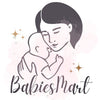Between 4 and 10 months, the baby's first teeth will appear. Toothing is unpleasant for some babies and can be a little upset and moody. But a ring with lots of love and cold teeth to chew should help.
About Teething-
Teething does not happen at the same time for all babies.
Usually, babies start teething at around 6 months, and all 20 baby teeth (10 in each jaw) come in by 2 or 3 years.
But don’t worry if your baby’s teeth come in at different times.
Teething symptoms-
Babies often have some discomfort as their teeth break through the gums. Common signs and symptoms include:
- crying more than usual
- red, swollen gums
- flushed cheeks
- being cranky and restless
- not feeding as well as usual
- sucking a lot on toys, fingers or fists
- having more dirty nappies
- a slight rise in temperature, but teething usually does not cause a fever (a temperature of 38°C or more)
- pulling on the ear
- drooling
These symptoms may not necessarily be linked to teething; they could be just a normal part of your baby`s development. But they could also be the sign of an illness. If your baby isn`t well, it is always best to see a doctor.
Tips to ease the discomfort-
- Wash your hands and gently rub your baby's gums.
- Provide your baby with a chilled (but not frozen) pacifier, pacifier, wet washcloth, or spoon.
- Give your baby something to suck firmly. B. Unsweetened rusks.
- Give older children soft food for a while so they don't have to chew too much.
Things to avoid-
- Tooth gel, as drinking too much can harm your baby.
- The amber-toothed beads can fall apart and choke your baby. If you choose to use them, always supervise your baby and remove the beads while you sleep.
- This is because homeopathic toothed pills are associated with the death of the baby.
Caring for baby’s teeth and gums-
It is important to care for your baby`s gums even before the first tooth appears. Wipe them gently a couple of times each day with a damp facecloth or gauze. When teeth start to arrive, establish a routine of cleaning them twice a day. Wrap a damp facecloth or gauze around your finger and wipe the teeth. Cup your baby`s head in your hand so you can see their mouth. Clean your teeth with a gentle circular movement. Be sure to clean the front and back of each tooth as well as the gums. If your baby allows, you can start using a soft toothbrush and water. Introducing toothpaste at the age of 18 months. Toddlers can use pea-sized low-fluoride toothpaste for children. It is important to protect your baby's new teeth from tooth decay by avoiding sweet drinks and not letting them sleep in bottles.
When to visit the dentist-
It is advisable to schedule your baby's first dental visit when the first teeth appear, or about 12 months, whichever comes first. Dentists and their teams are accustomed to dealing with babies and small children. The
dentist will review your complete medical history and advise you on tooth growth, brushing, caries prevention, optimal nutrition for your baby's teeth, and avoidance of habitual problems such as injuries and thumb sucking.
Always visit your dentist for a positive experience for your baby. Do not use your dentist as a threat to brush your teeth or prevent other actions.













